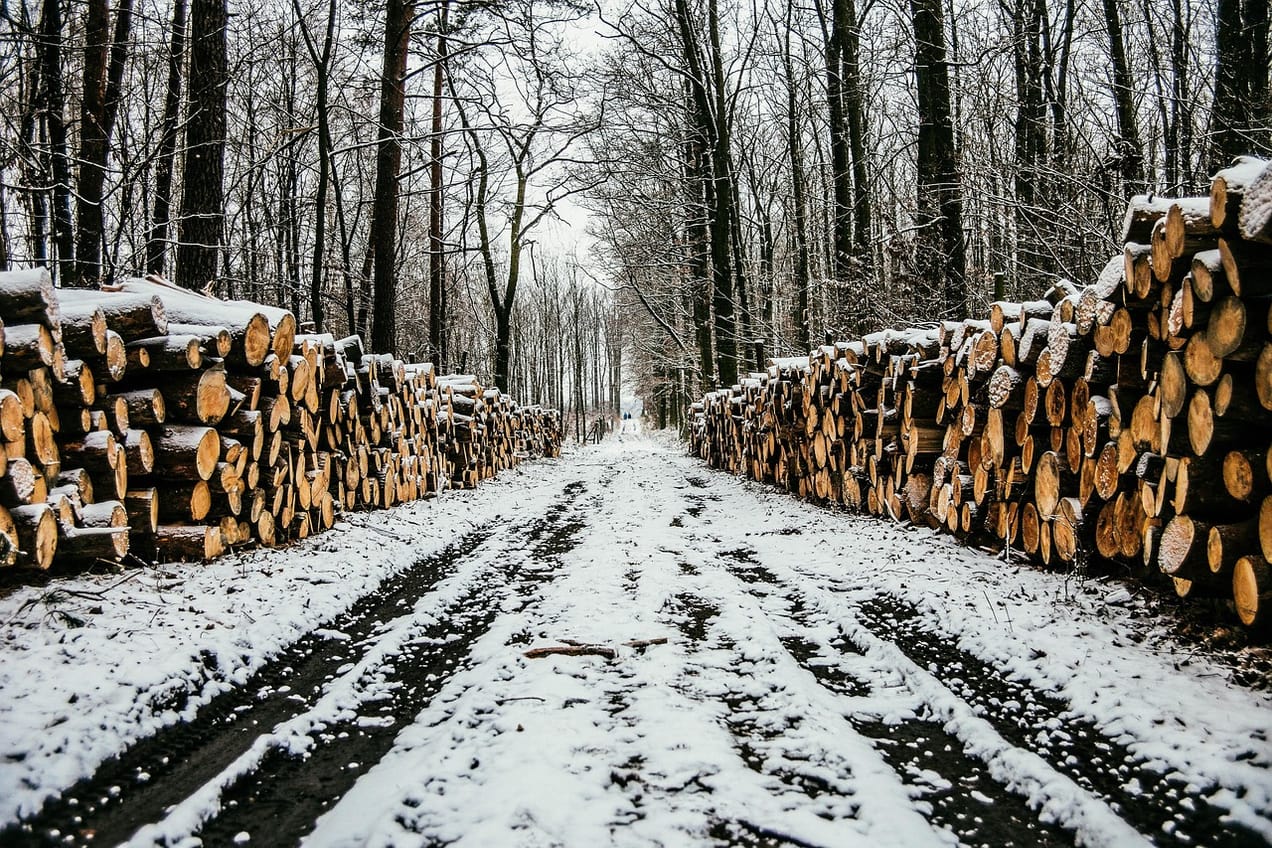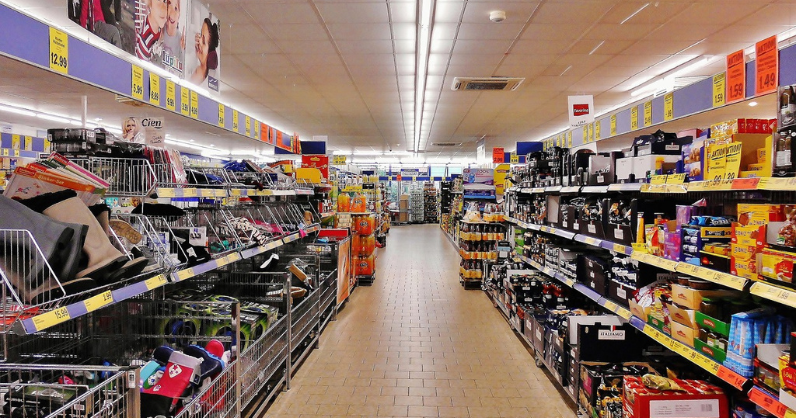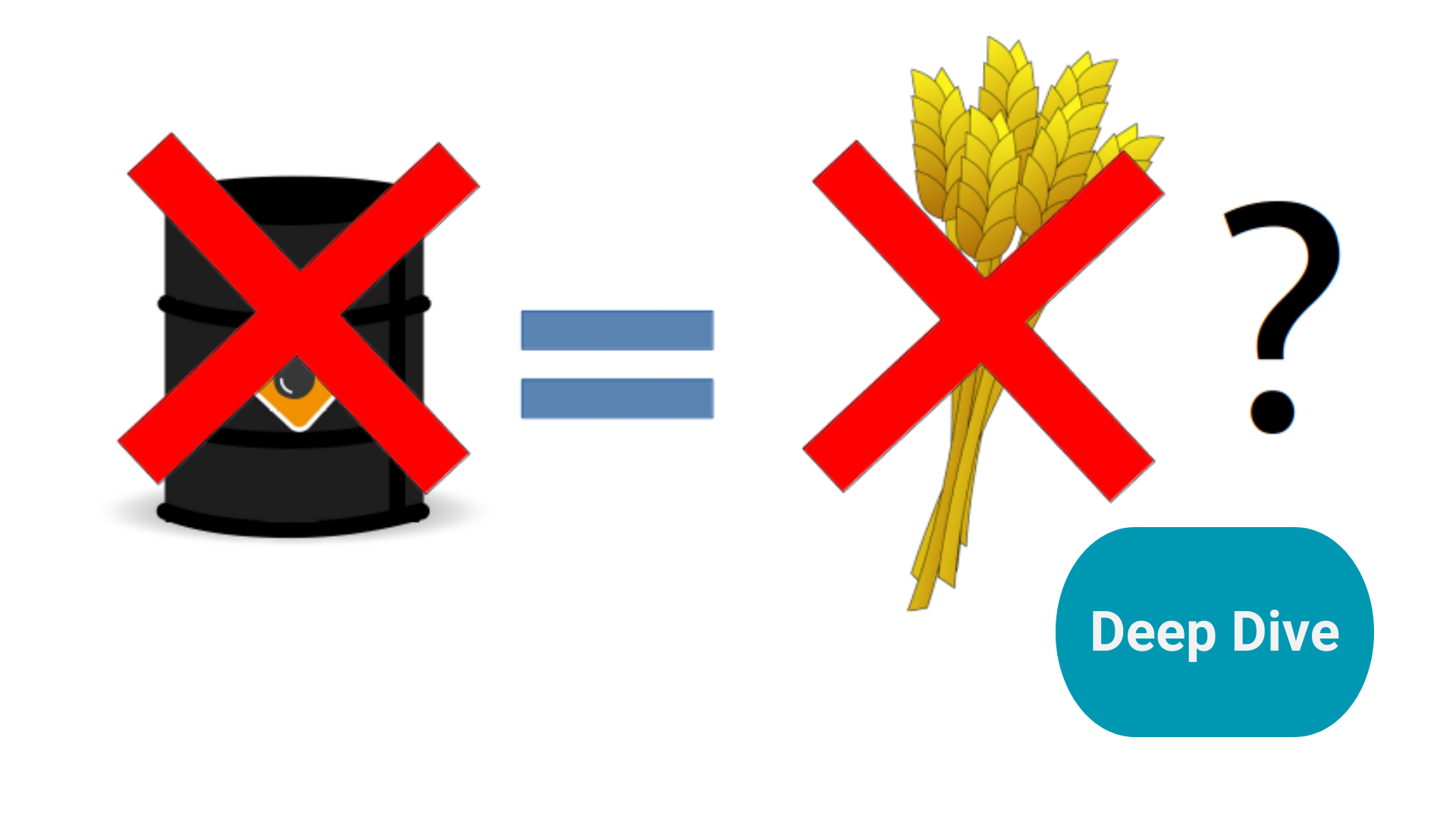
Will half the world starve without fossil fuels?
Not producing gas means we can't produce fertilisers, which in turn means we can't produce enough food to feed half the World. But is that true?
Summary: One of the key debates relating to the transition of agriculture to a more sustainable business model relates to the use of synthetic fertiliser. On one hand, nitrogenous fertilisers are recognised as being one of the contributors to the so called green revolution, which saw greatly increased crop yields and agricultural production. The flip side is that their production is a major producer of Green House Gas (GHG) emissions, and their use is now widely seen as having serious side effects including runoff related pollution and soil degradation. So, the question posed, is a key one - both in terms of climate change and the renovation of our soils and rural environment.
Why this is important: Many companies rely on our agricultural supply chains (think food producers and supermarkets for instance), so it’s a big long-term issue all investors should be considering. Recent food supply disruption and price inflation has brought it more to the fore.
The big theme: Agriculture (and its sibling, aquaculture) sit at the intersection of a number of UN Sustainable Development Goals (UN SDGs). As one reads through the list of goals they are either directly relevant (for example goal 2: zero hunger or goal 3: good health and well-being) or have a causal relationship (for example, education improving with better nutrition and less pollution). Reforming agriculture is going to require massive social and economic change and disruption, to production methods, to supply chains and to employment. It’s not clear (yet) that the political will to change fast enough really exists, which could mean faster and more dramatic change needs to come in the future.

The details
The chart below from Our World in Data has been regularly republished by commentators to highlight one of the risks of stopping oil and gas production: we will not be able to produce synthetic fertilisers (mostly nitrogenous fertilisers), which in turn means that we cannot produce enough food to feed half of the World population.
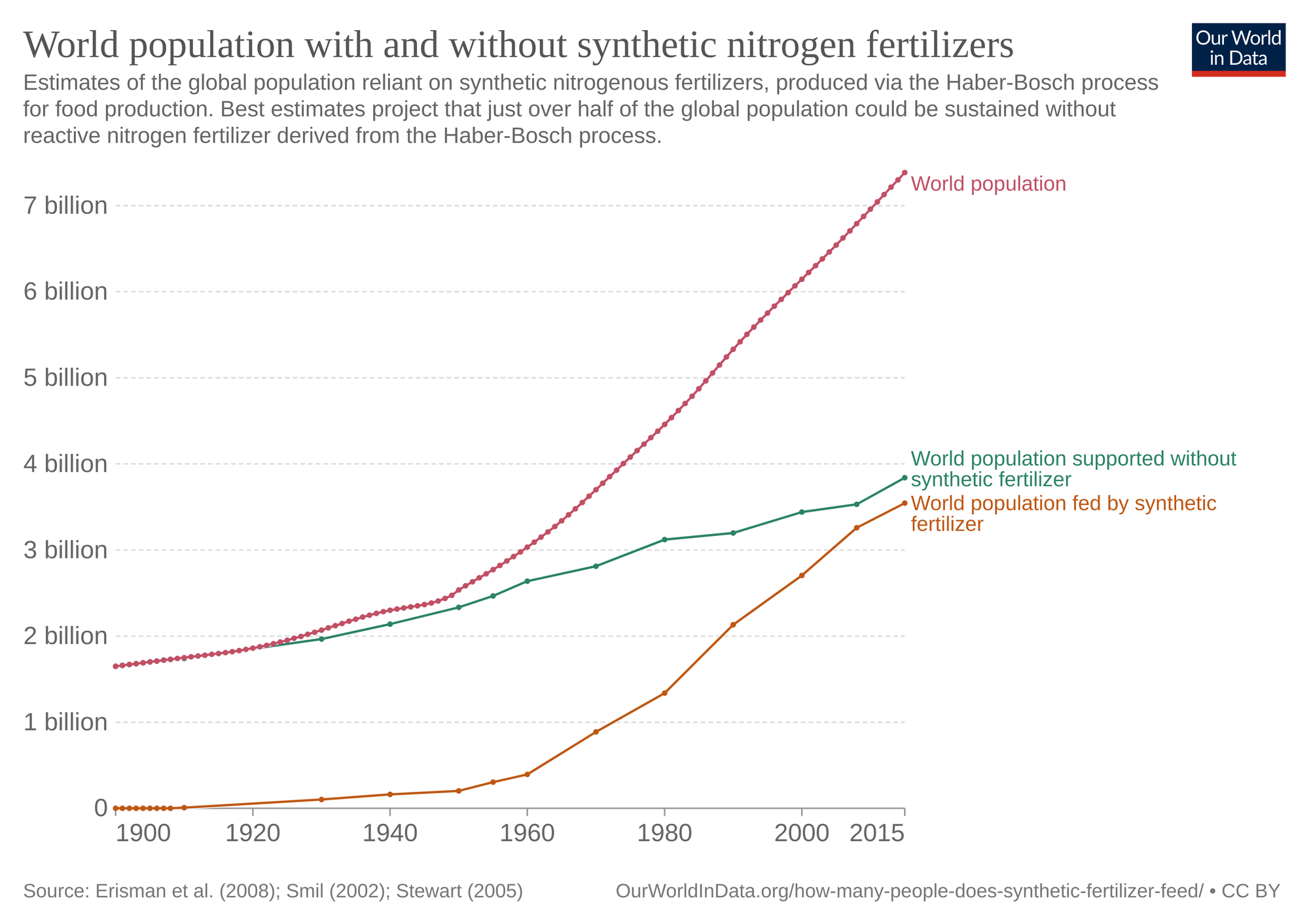
Is that assertion correct?
Looking purely at the chart, there are of course a number of assumptions in arriving at the figures for 'World population supported without synthetic fertiliser' and 'World population fed by synthetic fertiliser'. It is hard to separate out the contribution of fertilisers from other improvements in farming, for example, but a number of research papers quoted in the chart's data sources and in an accompanying article reach similar conclusions suggesting that in broad terms the proportion of the World population fed by synthetic fertilisers is reasonable at around 40% to 50%.
What constitutes 'feeding' is harder to ascertain. Nutritional requirements, including calorie requirements will vary based on individual biology, environment and activity. Arguably in the Western world and many developed nations we eat beyond (and in some cases well beyond!) our basic nutritional requirement.
Back to the main assertion that commentators are extrapolating: stopping oil production means half the world will starve.
There are actually a number of separate questions within that assertion:
- Do we need oil and gas (hydrocarbons) to make synthetic fertilisers? The answer to this is currently (mostly) yes, but low carbon alternatives are emerging fast.
- Do we need to use so much synthetic fertilisers? The answer to this is no - we’re incredibly inefficient in our use of fertilisers, and we’re using far more than we need.
- How do we feed the World population? (how much food do we need?) To answer this we need to think about the entire food system, not just farm production. We can do much more with less inputs.
We shall look at those in more detail...
What is the big theme?
Agriculture is a major source of GHG emissions (22% of global), water usage (72% of global freshwater withdrawals) and a vector for antimicrobial resistance propagation (see our AMR Primer).
Agriculture (and its sibling, aquaculture) sit at the intersection of a number of UN Sustainable Development Goals (UN SDGs). As one reads through the list of goals they are either directly relevant (for example goal 2: zero hunger or goal 3: good health and well-being) or have a causal relationship (for example, education improving with better nutrition and less pollution).
The United Nations Food and Agriculture Organisation (FAO) currently estimates that almost 690 million people (just under 9% of the global population) are hungry. UN SDG 2: Zero hunger, aims to eliminate hunger and ensure access by all people to safe, nutritious and sufficient food all year round by 2030. The UN believes that under current assumptions that goal will not be reached, with more than 840 million people still suffering from hunger by 2030.
Reforming agriculture is going to require massive social and economic change and disruption, to production methods, to supply chains and to employment. It’s not clear (yet) that the political will to change fast enough really exists, which could mean faster and more dramatic change needs to come in the future.
What are the financial considerations?
There has been historically less interest from investors in the whole agriculture and natural capital space than its importance deserves. Yes, it’s a big topic in the private space, but not in public equities. Some of this is due to an absence of quoted investments with an obvious exposure to the theme, and many of the companies that do exist are smaller, local and less liquid.
However, many larger investible companies rely on our agricultural supply chains (think food producers and supermarkets for instance), so it’s a big long-term issue all investors should be considering. Recent food supply disruption and price inflation has brought it more to the fore.
And, as the challenges before more serious, often exacerbated by issues such as droughts, the opportunity for investors to make a real difference, and earn a fair financial return rises. But, as with many transition challenges, we need to change our way of thinking.
What are synthetic fertilisers?
Before we tackle the questions let's first look at what we mean by synthetic fertilisers and start off with why we need them at all.
Plants need a variety of nutrients for optimal growth. The majority are absorbed by plants through the soil. After harvesting, those nutrients in the soil need to be replaced and that is where fertilisers come in.
Organic fertilisers are naturally produced and derived from animal, plant or mineral sources and include plant-based products such as compost, animal waste and byproducts such as manure and slurry and even fish emulsion and seaweed extract.
Organic fertilisers tend to deliver their nutrients slowly into the soil and so with the industrialisation of agriculture, a desire to find a way to deliver nutrients more quickly led to the development of synthetic (or inorganic) fertilisers at commercial scale.
The main three nutrients in commercial synthetic fertilisers are:
- Nitrogen: this is the big one. Plants absorb more nitrogen than any other element as it is essential for making protein.
- Phosphorus (in the form of phosphorus oxides): this is important for photosynthesis or how plants generate energy; and
- Potassium (in the form of either potassium chloride or potassium oxide): this helps build resilience against disease and weather. The standard way to rate potassium fertilisers is to give a 'potassium oxide equivalent' content percentage, regardless of whether the potassium from a chloride or oxide.
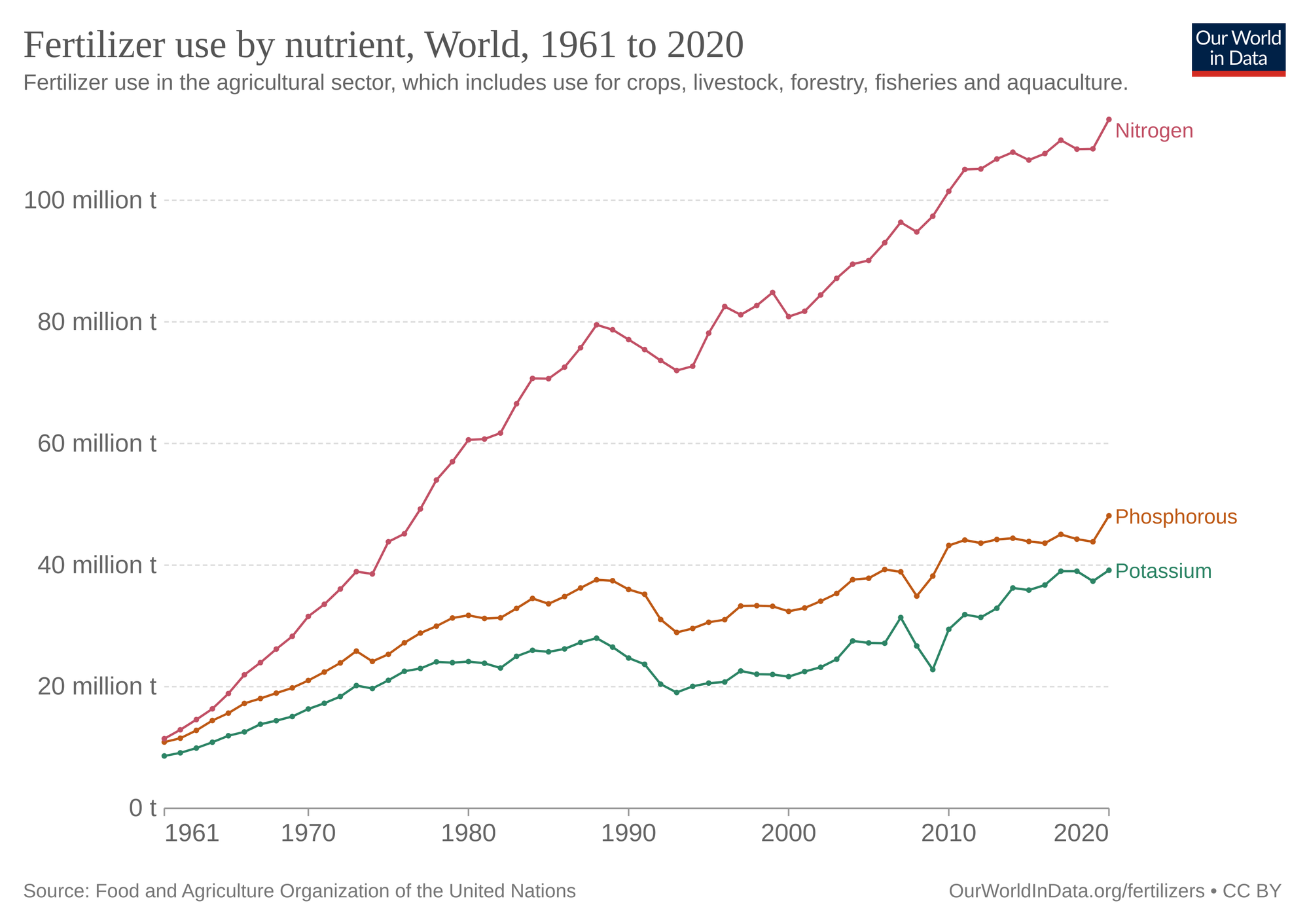
So there are essentially three main classes of fertiliser as a result:
Potassium fertilisers are derived from mined ore, potash rock.
Phosphorus fertilisers come from phosphate rock (another mined ore) which is treated with sulphuric acid to become phosphoric acid (or also single superphosphate) which is then mixed with ammonia to produce monoammonium phosphate (MAP) or diammonium phosphate (DAP).
Nitrate fertilisers are the largest and are also made from ammonia which is oxidised to produce nitric acid and with ammonium to form ammonium nitrate (AN) or with CO2 to produce urea. Mixing AN, urea and water produces another fertiliser - urea ammonium nitrate (UAN).
About 80 percent of ammonia produced today is used to make fertiliser. Where hydrocarbons come in are in the production of ammonia.
Do we need hydrocarbons to make synthetic fertilisers?
Below is a schematic showing how ammonia is made on an industrial scale using the Haber-Bosch Process. The inputs are natural / fossil gas to form methane through a process called Steam Methane Reformation (SMR) which in turn is used to produce hydrogen which then under high heat and pressure reacts with nitrogen over a catalyst to produce ammonia.
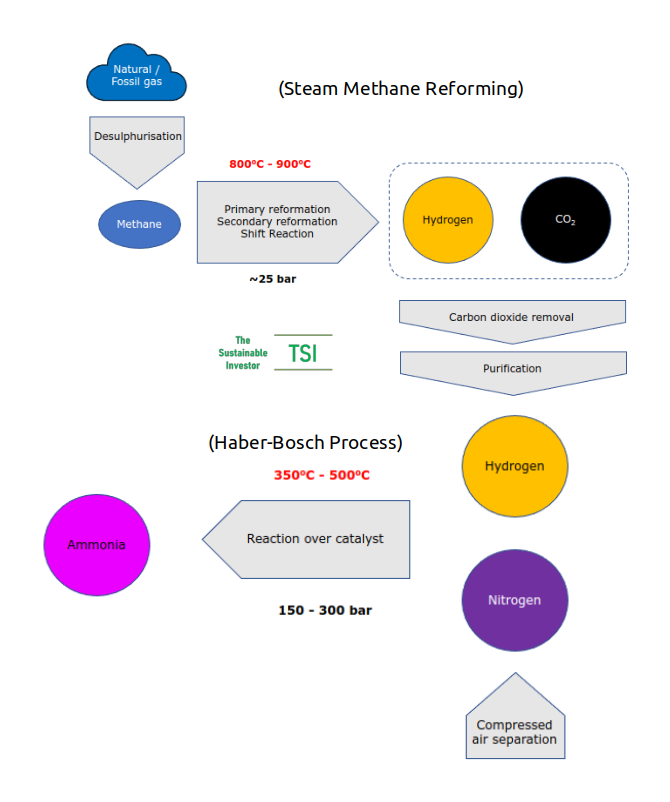
The ammonia is then taken and as previously mentioned reacted with in different ways to produce either various nitrate fertilisers or MAP or DAP.
Alternatives to the Haber-Bosch process itself are being looked at from exploring lower temperatures (which could bring in alternative heating sources such as industrial heat pumps) and lower pressure requirements through to utilising bacteria.
But the key way of decarbonising ammonia production now is by finding ways of making hydrogen without using hydrocarbons and also finding low carbon ways to generate the heat and pressure required for the process.
Alternatives range from SMR but capturing the CO2 produced, through to using renewables to create green hydrogen through electrolysis which breaks down water molecules into oxygen and hydrogen.
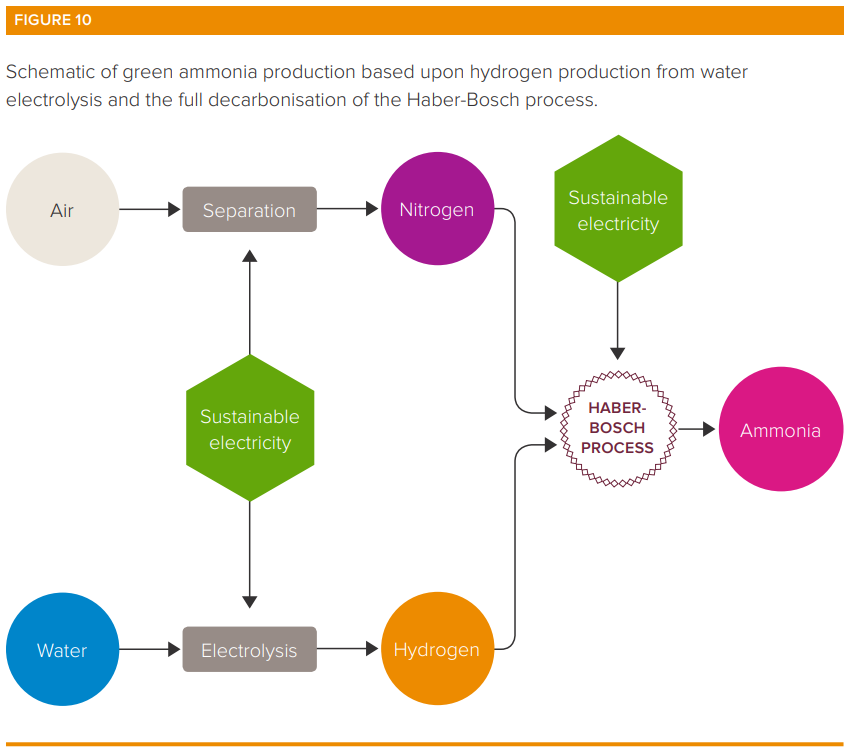
The cost of renewable energy is therefore an important cost factor and as prices fall an important catalyst for green ammonia plants to be developed emerges. A number of important plants have been developed.
Unigel and thyssenkrupp nucera are already increasing production capacity at their green hydrogen plant in Bahia, Brazil from 60 MW to 240 MW. When completed at the end of 2023, it will be the first industrial-scale green hydrogen plant in Brazil and an initial production capacity of 10,000 tons/year of green hydrogen and 60,000 tons/year of green ammonia.
There are also plans to integrate the process vertically. Atlas Agro, for example, is on a mission to develop locally produced zero-carbon fertiliser. It recently signed a purchase and sale agreement with the Port of Benton for 150 acres of land in the North Horn Rapids Industrial Park in Richland, Washington to build a $1bn zero-carbon fertiliser plant which integrates green hydrogen production through electrolysis of water with an ammonia plant, nitric acid plant and and an ammonium nitrate plant. The company has one year to assess the feasibility of the proposed facility and make a final investment decision.
Do we need to use so much synthetic fertilisers?
Data from the Food and Agriculture Organization of the UN (FAO) seems to suggest a positive correlation between nitrogenous fertiliser use and cereal crop yields, specifically those harvested for dry grain (so not including fodder crops or industrial crops like broom sorghum).
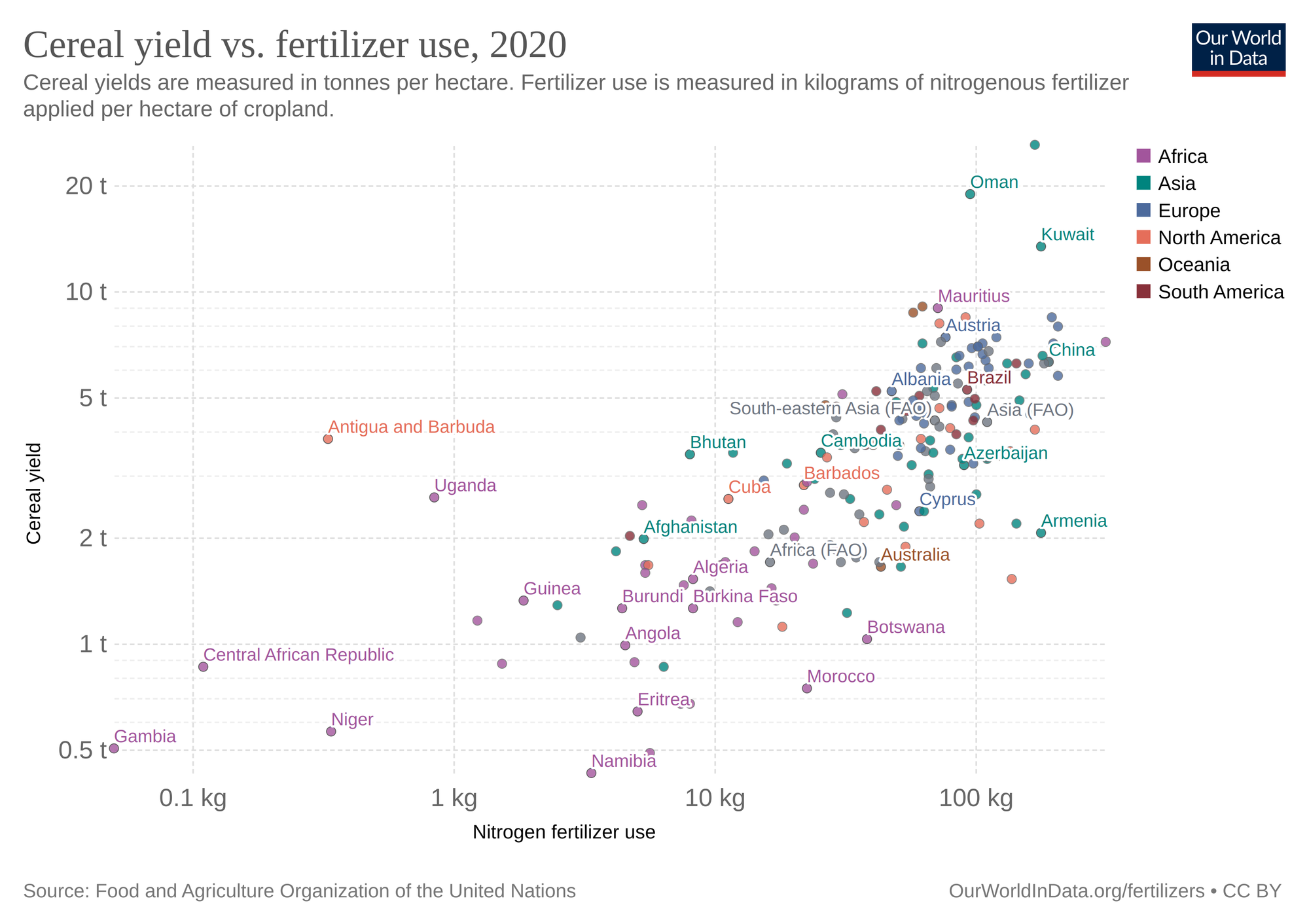
But do we need to use so much?
Wuepper et al, in a 2020 paper published in Nature Food, found evidence of overuse of fertilisers and ultimately unnecessarily high nitrogen pollution.
"...countries influence nitrogen pollution much more than crop yields and there is only a small trade-off between reducing nitrogen pollution and increasing yields. Overall, countries that cause 35% less nitrogen pollution than their neighbours only show a 1% larger yield gap (the difference between attainable and attained yields). ... Our findings suggest that many national governments have an impressive capacity to reduce global nitrogen pollution without having to sacrifice much agricultural production."
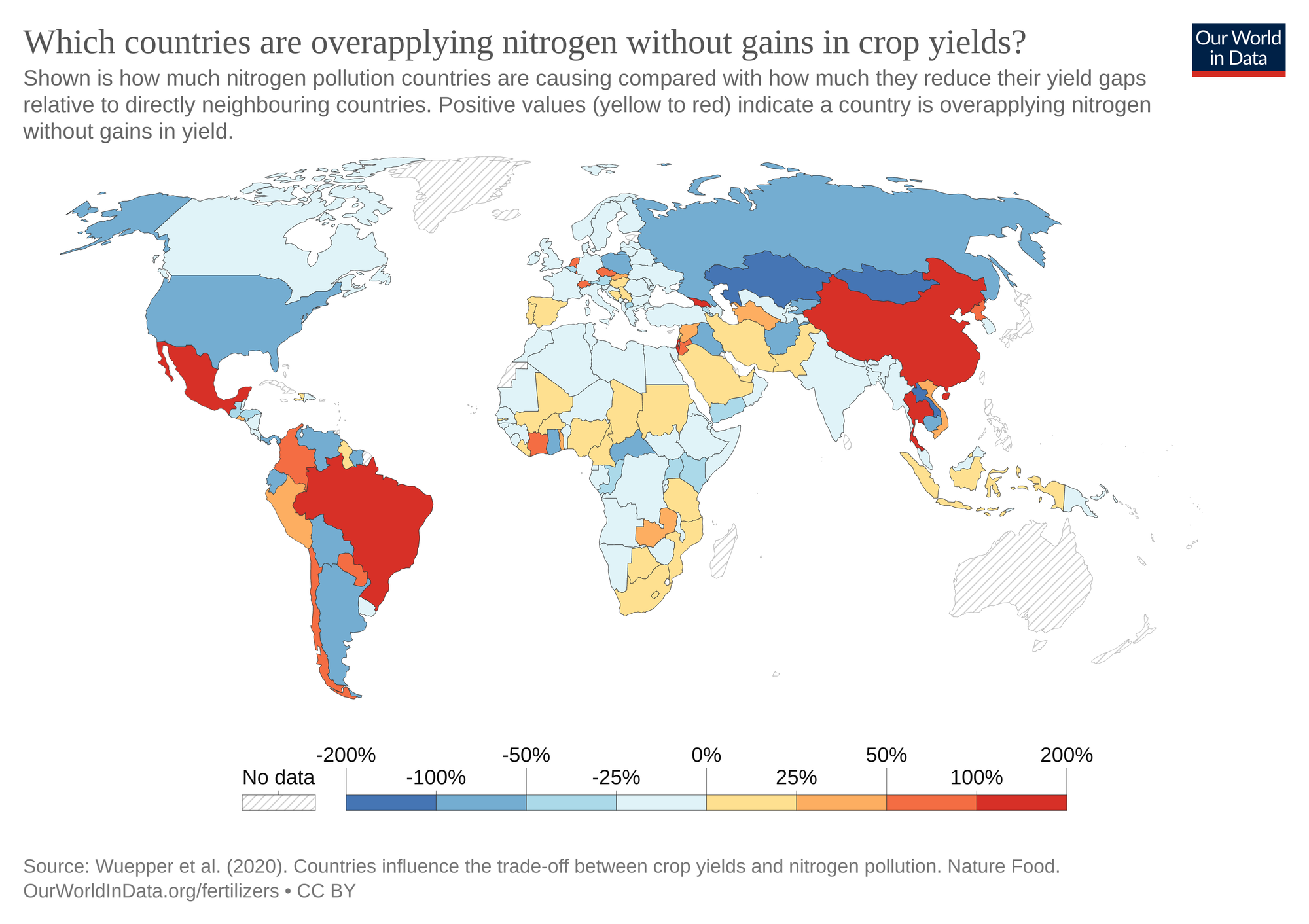
Research from Gao and Serrenho from Cambridge University, mapped the global flows of manure and synthetic fertilisers and their emissions, along all stages of the lifecycle from production to deployment for 2019. They found that unlike a lot of products, for fertilisers, most emissions occur during use rather than during production.
They also estimate that a combination of scalable technology and policy solutions could reduce the emissions from manure and synthetic fertilisers by as much as 80% from current levels without a loss of productivity.
One of their suggestions we have already discussed - decarbonising heating and hydrogen in production; another is swapping out fertilisers with the highest emissions such as urea with ammonium nitrate - obviously that only makes a real impact if the first of the suggestions happens.
However, the most effective way that they recommend is to actually reduce the amount of fertiliser being used.
“We’re incredibly inefficient in our use of fertilisers,” said Serrenho. “We’re using far more than we need, which is economically inefficient and that’s down to farming practices. If we used fertiliser more efficiently, we would need substantially less fertiliser, which would reduce emissions without affecting crop productivity.”
Regenerative farming practices including no-till farming and cover cropping improve the health of the soil microbiome reducing the need for chemical fertilisers, as well as improving the ability for soil to absorb and infiltrate water. That should result in better nutritious value, i.e. a better nutritional yield. However, regenerative farming is difficult to scale and not suitable in all locations. We shall take a deeper dive into regenerative farming in a later blog.
How do we feed the World population?
So we have seen that we may not need as much fertiliser to produce a given amount of crops.
How much of the crops that we produce are actually consumed by people? In other words how much of crop growth is 'wasted' through the value chain right up to the consumer's mouth?
Currently almost 40% of arable land and more than 30% of cereal crop production is used for animal feeds, whilst 23% of all captured fish are used for fish and livestock feeds and other non-food uses.
They concluded that replacing livestock and aquaculture feed that could be used for human consumption with food system by-products and residues could free up enough food to feed an additional one billion people. The changes proposed could redirect between 10-26% of total cereal production and approximately 11% of current seafood supply to human use. This would represent as much as 15% of current food supply protein content and up to 13% of caloric content.
Free up enough food to feed an additional one billion people!
According to data from the FAO Global Livestock Environmental Assessment Model (GLEAM), 86% of the 6 billion tonnes of dry feed matter consumed by livestock annually is made of resources not edible by humans, with the bulk made up of grass and leaves (almost half). Crop residues and by-products already make up a proportion of livestock feed (almost one-quarter).
However, whilst accurate, the “86%” figure could hide the potential for improvement. A 2017 study found that...
“producing 1 kg of boneless meat requires an average of 2.8 kg human-edible feed in ruminant systems and 3.2 kg in monogastric systems. While livestock is estimated to use 2.5 billion ha of land, modest improvements in feed use efficiency can reduce further expansion.”
There can also be waste at the point of harvesting for not being the right shape, through to surplus fresh food thrown away at the point of sale or in our homes. In the UK for example it is estimated that 3 million tonnes of good, edible surplus food is thrown away each year. UN Sustainable Development Goal 12.3 aims to halve food waste at the retail and consumer level and to reduce food loss across supply chains.
There are even ways of reducing food waste in the home. Here is something we wrote on that topic 👇🏾

There are also alternative nutrition sources from insects to mycoprotein (fermented fungus) to cell-cultivated proteins. Additionally there are alternatives to feed for livestock and aquaculture that could enable some of the proposals from professor Kummu, including fish food substitutes from microalgae and creating symbiotic relationships such as cultivating sea cucumbers alongside marine fish farms feeding on the waste from those farms.
But what about reconsidering our whole philosophy to food production?
Now here is a strange sentence for you: could a focus on productivity promote system inefficiency? Excuse me, what? That doesn't seem to make sense does it.
However, This interesting hypothesis is put forward by Tim Benton and Rob Bailey from the Energy, Environment and Resources Department at the Royal Institute of International Affairs, Chatham House. The key is where that focus is. They propose shifting the current policy focus for food from yields per unit input or ‘Total Farm Productivity’ to the number of people that can be fed healthily and sustainable per unit input or ‘‘Total Resource Productivity’. This would, in their view, increase the efficiency of the overall food system.
The focus on ‘yields per unit input’ has led to a massive growth in agricultural produce supply and subsequent declines in price. However, the availability of increasingly cheaper calories has led to a vicious circle of increasing demand for cheaper production, driving damage to the environment, increasing waste, and higher levels of obesity (now exceeding the prevalence of underweight).
Measured as the amount of food grown that is eaten by humans, the current inefficiency in the global food system is a result of the drive for efficiency at the farm level - the “paradox of productivity.” Production has become specialised on a small number of highly productive crops crowding out traditionally grown varieties and creating a dependency risk on certain areas of the world (e.g. the so called ‘breadbasket’ areas). More than 50% of the world’s crop calories as of 2014 came from just 3 things: wheat, rice and maize. More than three-quarters of all crop calories came from those three plus sugar, barley, soy, palm and potato.
The yield improvement focus has led to a reduction in the variety of crops providing calories with a focus on a small number of crops. The creation of hardier strains of wheat through cross-breeding, for example, has produced strains that contain novel proteins that are hard for many to digest. A return to a broader set of crops can not only potentially help reduce inflammation but also there is an important social aspect in encouraging the growth of local and indigenous communities, increasing subsistence and rejuvenating local areas.
Finally it is worth noting that legumes (including beans, pulses and peas) can fix atmospheric nitrogen better than most crops into reactive nitrogen in the soil. Reducing meat consumption can also reduce the need for feed as a consumer of crops.
Conclusion
As the World population grows, how we feed everyone is a critical issue. Fossil derived hydrocarbons have played an integral part in industrialising crop and livestock production but through greening of synthetic fertilisers and changing how we approach the production of food, we should be able to reduce oil and gas production without compromising our nutritional requirements globally.
Something a little more bespoke?
Get in touch if there is a particular topic you would like us to write on. Just for you.
Contact us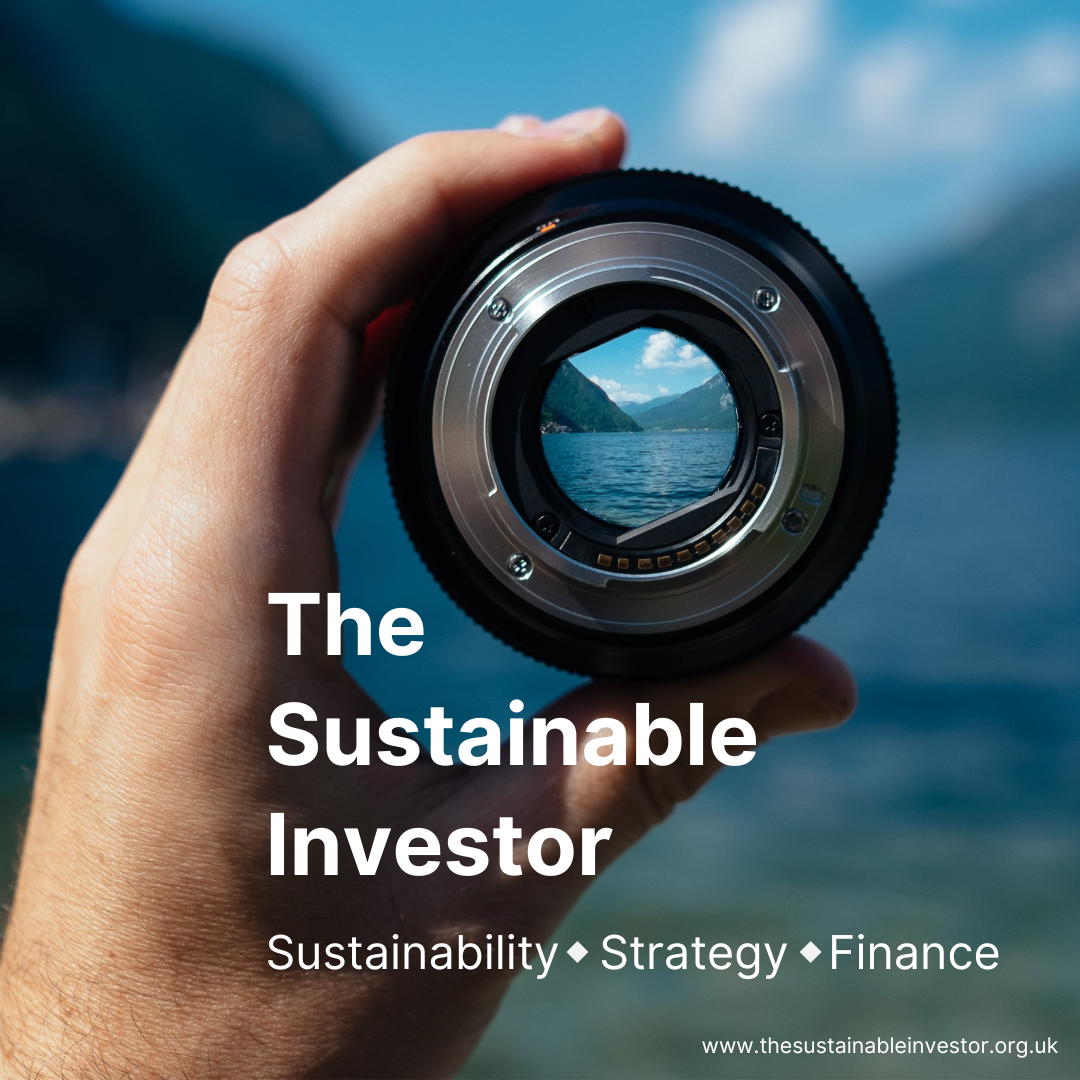
Please read: important legal stuff.

